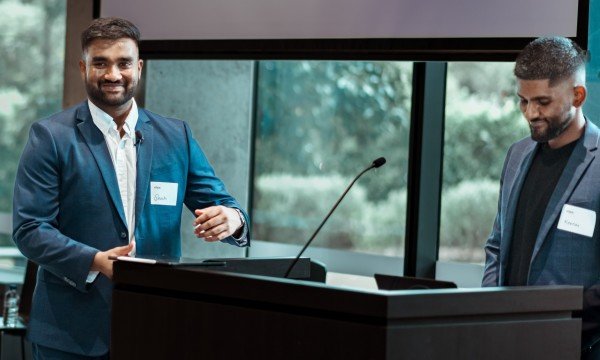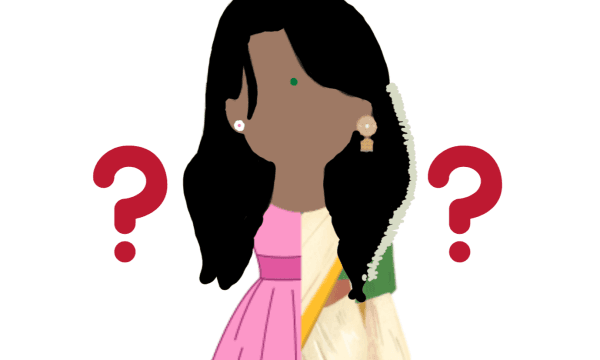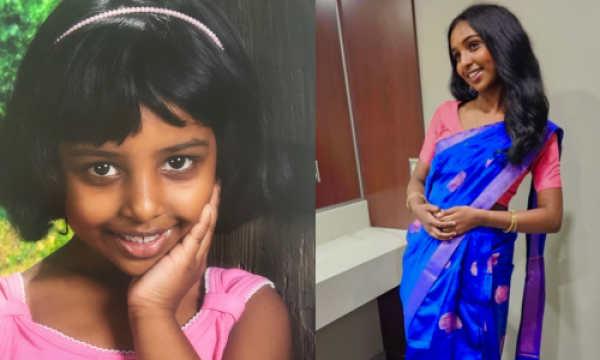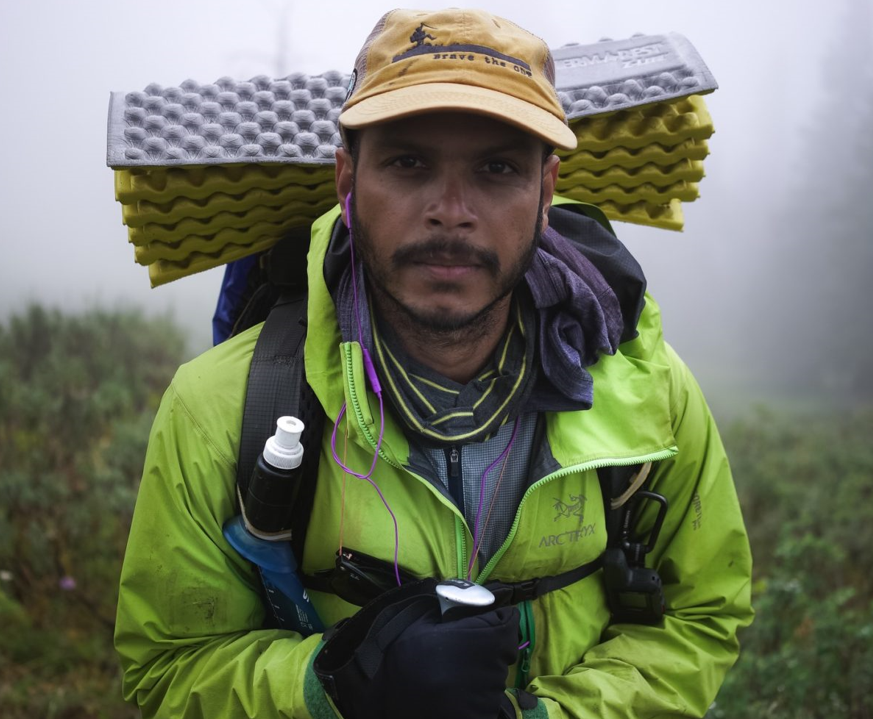
Amiththan Sebarajah will be setting off to hike 5000+ miles up between the Mexican and Canadian borders in the US this summer.
Link to audio documentary that Amiththan produced for the CBC on distance hiking & trauma along the Arizona Trail.
___
***Are you or someone you know in the global Tamil community doing great things? We'd love to feature them: FILL OUT THIS FORM ***
Network & collaborate with Tamil Changemakers from around the world. Request to join our private LinkedIn community here.
___
Talk about your upbringing and the path you took to come to Canada.
I grew up between two vast bodies of water, between the Batticaloa Lagoon and the Indian ocean, in the omnipotent shadows of The Mari Amman temple and the STF camps. Sometimes I’d intentionally miss the ‘school van’ just so that I could walk home, often to my mom’s chagrin and, as I understood later, to her visceral fear. The country side was full of children-eating phantoms, those faceless creatures stationed at check points to identify rebels. I just loved that sort of meandering amble from Batticaloa town, over the Kallady bridge, through the army camps and sandy laneways of the village. Once, when I was 8, I walked home while Batticaloa police station was under attack. I had seen the ‘boys’ preparing for the attack on the way to the school that morning. Machine gunned shadows climbing over Bougainvillea cement walls. That day, a turning point of the Eelam wars in the East, more than 250 cadres took over the station and executed three policemen, one of them was my school friend’s father. My friend was both Sinhalese and Tamil. We were from the same village. There was a vihara in my town next to a Pilayar temple, and a mosque; all within walking distance from the police station, of course, next to the petrol shed that the boys blew up before the attack started. It was a beautiful, violent and complicated place where the people had no choice but to be constituted as traitors to at least one faction of the many paramilitary, governmental and political factions that sought to represent them in the struggle.
I wonder often about how to translate the name of the space and place into which I was born. I even wrote about it. Sharing it here, I hope, will tell you something about me and the path that lead me from a putative ‘There’ to an ever changing ‘here’ that are the worn-out gears of any refugee story:
Bay of Blueberries. The transliteration is inadequate, not at all evocative as its local name. It’s a reach anyway, because there aren’t any blueberries grown in the area. I certainly won’t see or eat an actual blueberry till I would be long gone from this place. The English approximate is almost too literal, harsh. It lacks subtlety. I don’t know why I bother. In any case, I know that it is not a berry because the fruit is pitted. The seed is hard, cloven.
Maybe it’s Purple Bay, but that doesn’t connote the layered story. There is a bay, sure, many of them, in fact, but not all of them provide safe harbour. But of course, that’s a matter of perspective. if I walk any one of the roads, lanes and grassy paths going due West, I’ll end up on the shores of a lagoon. Due east is the Ocean, treacherous in its own way, despite the lack of subaqueous rock or coral reef.
There are purple fruits, too. Well, one such anyway. I like to think the village is named after this fruit, but the fruit is named after a colour. It’s a sticky, delightful mess. It grows in hanging clusters on a tree, if left alone, which grows in width and height to a multi-limbed foliage. Deciduous, naturally. The leaves are elongated, wax-dipped green, elven ears with a strong midrib running as straight as truth. The tree is named after the fruit which is small and somewhat oblong. Its skin is more black than purple except when it blisters, no longer able to contain the passion of its flesh in the tropical heat. When the sun flays back the skin, the fruit reveals a delicate periwinkle. It’s a changeling: it flowers as budding tendrils which turn green the size of a peanut, then pink, then the colour of spilt blood, and finally purple black like a bruise.
Syzygium Cumini. No, but this one at least sticks to my tongue true to the telltale purple stain after I have tasted a handful. It tastes sweet and astringent.
The point is, I have always loved walking, matching my heart beat to the violent pulse of the land where war, trauma, disruption and dislocation was both noise and backdrop. Always.
Then one day an armed group—LTTE would claim the attack after the fact-- attacked the mosque in Kattankudi. One of father’s business partner and his son were among the men murdered that night. His other partner and the Son-in law of Jinna uncle was shot dead at home in front of his children later that evening.
My dad fled. My mum uttered prayers while we counted tamarind seeds to keep track of the mantra in groups of 108 iterations, on a nightly basis until Canada granted my father political asylum on the account that some of his brothers were executed as traitors to the cause.
How did you choose Meadow Creek as home vs say a major city like Montreal, Vancouver or Toronto?
I was getting increasingly frustrated with my grad school experiences and all the community politics and posturing in Toronto, a period captured in Dr. Amerasingham’s Pain, Pride and Politics. Amar and I were both students at U of T at the time. But there were so many like us, surviving the survivors of disrupted lives in those days, leading Tamil Student Associations, quietly working away at our undergrads with grand ambitions, fighting it out at Tuxedo court or the spare woodlands behind Scarborough Town center, nightshifts at warehouses and Tim Hortons. I was part of the first group of student volunteers to return to Sri Lanka as a movement since the founding of EROS in London. It was during the Norwegian brokered ceasefire. Unbeknownst to us at the time, we launched a framework for Tamil Canadian diaspora youth activism and engagement when a group of us founded the Tamil Student Volunteer Program. Then later, some of us founded Sri Lankans Without Borders initiative.
Whenever I visit Toronto these days, whenever I see Tamil youth and the various ways in which they have taken up space in the cultural and political landscapes in such a short time, I am so amazed. It wasn’t that long ago that there was simply nobody to look to. I am quite proud of the doors that we kicked upon, as idealistic as we were only two decades ago. It’s a wonder to behold these things unfolding in real time and also to witness the obsolescence of older paradigms that once seemed so vital to Tamil youth identity in Toronto.
These days in the foothills of Purcell mountains and hanging glaciers I look forward to the time when the bears visit, when the salmon and eagles return to the creeks. Not too far away, however, there’s lives a retired anthropologist who had lived and worked in small communities and jungle hamlets within the womb of the Eastern province, where militancy and war were as part of the fabric of daily life as the kovil sadangu and the rice farming and the fishing. Her work documents the disremembered time in the East. I am trying to figure out my part in that story.
You mentioned that "land does not belong to you; you belong to the land", what did you mean by this?
It’s a transliteration of an old idea that persists across the globe among indigenous people: Tongata Whenua.
The Whanganui Iwi in Aoteoroa gifted me with this aphorism when I was walking along Te Araroa trail in New Zealand. It’s a profound relationship to space and identity not as separate but as a reciprocity. Land is neither the context nor backdrop for people; rather, there is no people without the land.
In English the phrase is sometimes spoken as I am the river; the River is me; I am the mountain; The mountain is me. The land as people as one.
_____________________________
Related Articles:
- "The Tamil Creator Podcast (EP #54): Chief Nishan Duraiappah - North America's First Tamil Chief of Police"
- "The Tamil Creator Podcast (EP #53): Chantal Sathi – From Scarborough To Oxford, Culminating In A Faith-Led Journey To Create Tech Company CornerstoreAI"
- "The Tamil Creator Podcast (EP #52): Himalesh Kumar - American Tech Entrepreneur Overcomes Dyslexia To Sell His Company To Warren Buffet's Berkshire Hathaway"
- "The Tamil Creator Podcast (EP #51): Samanta Krishnapillai - Sparking Social Change As Founder & Executive Director of "On Canada Project"
- "The Tamil Creator Podcast (EP #50): Thad Jayaseelan - Jet-Setter, Budding Entrepreneur & Go-To Barber For Athletes & Celebrities Like Drake And Big Sean"
- "The Tamil Creator Podcast (Ep.49): DJ Kow - Trailblazing & Popular Toronto-Based Female DJ"
- "The Tamil Creator Podcast (Ep.48): Gobinthiran Kulendran - 9 Schools And 21 Location Changes During A War Couldn't Stop This Entrepreneur From Finding Success"
- "The Tamil Creator Podcast (Ep.47): Mathusha Senthil - Founder/CEO of Sex Toy Company (Thaen Pot) & Media Platform (Thaen X)"
- "The Tamil Creator Podcast (Ep.46): Ruban Kanapathippillai - Serial Tech Entrepreneur With Two Exits Collectively Over $1 Billion"
- "These Tamil Entrepreneurs Share How They Grew Their Side Hustles"
_____________________________
What made you decide to take up long-distance solo routes? What is thru-hiking and why do you like it? Being a person of colour discovering the outdoors or while thru-hiking is not common and you've had a few negative experiences around this. What advice do you have for a growing number of people (including fellow Tamils) that are looking to do this?
I like to walk. It has been the closest thing to meditating for me, learning to match my footsteps to my heartbeat, for hundreds and thousands of kms. Walking has also been an act of remembering. This is crucial, I think.
I got on the Appalachian Trail to get out of my head, initially. I wrote my thesis on belonging, centering my experiences of growing up in Sri Lanka and my early activism within a desperate and at times violently-at-odds-with Toronto Tamil diaspora. And I spent the next six months over 2000+ miles resolving, dissolving and actively remembering what is like to belong to a space, any space, that has so many conflicting ideas and attitudes about what belonging may or must mean.
If I am to talk about being a person of colour in these historically white centered spaces like a trail and the outdoors, I also have to say that all spaces have their own hegemonies built in, are vigorously and violently contended. My grad school experience wasn’t all that different in that regard. Ask any one taking up space in places where they are perceived as a minority, belonging is always a fight.
I am not sure I have any advice on that front for anyone wanting to engage these spaces that seem alien or foreign or threatening. You don’t escape racism or prejudice. There is no magic line to step across. A space becomes a place as a function of the politics that operate in that space. We don’t really have much of a choice other than to confront and contest the politics. It’s both messy and beautiful.
But if you want to know about how to pack or what to eat for 1 day or ten day or a hundred-day hike, hit me up. I am happy to talk.
What is your favourite book(s) you've read recently or a podcast(s) that you've listened to recently that's had an impact on you?
If you ask an English major, they will answer this type of question with another question or give you a list as long as their spice rack. That said, I love reading Judith Butler, Peggy Phelan, Richard Wagamese, Leanne Betasamosake Simpson, Amitav Gosh, Arundathi Roy, Kim Stanley Robinson, Keri Hulme, and Anne Rice as a teenager and Ambulimama and Ananda Vikatan, and Rani Comics as child. And of course, special shout out to the inimitable Master Sivalingam and the tiny library in Navatkudah for installing a love for stories --there’s a theme in there; I am sure of it.
What is your favourite Tamil movie?
Nayagan and Bombay remain two of the most influential tamil movies I’ve ever seen. And Karnan, too. I don’t really watch or can pretend to fully understand newer Tamil movies---what’s up with all the English dialogues, though?
What is your favourite Tamil food (meal or dessert)?
If amma wants to bribe me to stay home longer, she will make me Puttu and Chicken Liver curry. Valerie, my partner, makes a killer vattilappam. I’ll forever crave my aunties’ chicken curry, kurinnja sundal and muttaiappam.
If you were given $1 billion, how would you allocate the money to change the world?
I don’t think it’s a matter of spending money that’s going to change the world.
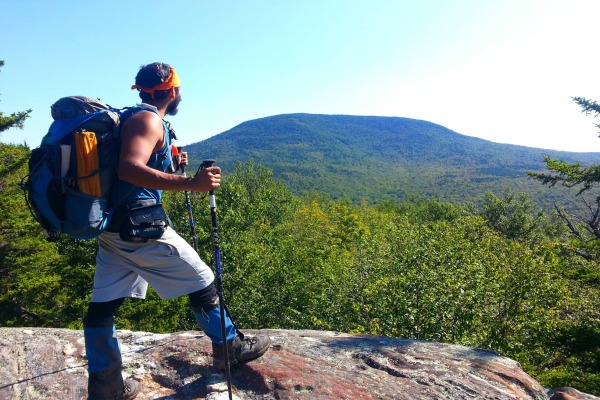
What does Tamil culture mean to you?
Culture is a process and we are fatally interdependent on those with whom find ourselves in community by choice or otherwise. I think the point is to resist attitudes that seek to reduce Tamil or Culture (or Tamil culture) to become a calcified relic via dubious claim to authenticity. Authenticity is a perspective—a loaded and dangerous one at that.
In this respect I can leave you with the following expert from an old paper I wrote on Belonging:
As with any identity closely tied to specific regions, the language itself had the requisite ecological flavour; Batticaloa Tamils, of whom I claim my lineage, spoke with a differentiated lexicon than their cousins in the Northand elsewhere while Muslims in the East spoke a Tamil replete with Islamic influences, seafaring and mercantile heritages and also according to the inflections of their various places of habitus. The Indian indentured Tamils, too, spoke a Tamil of their own that was and is inflected heavily by their status as low-waged, disposed labourers isolated into ghettoes in the hills of Central Sri Lanka. Thrown into this Babel of Tamil are the decedents of Portuguese and Dutch colonialists who remained in the country long after the powers departed. A significant population of them, the perennial colonial rem(a)inders, live scattered across the country, especially in the Eastern province in places like ‘Dutch Bar Road’ where they speak their own brand of Tamil. Of course, Sri Lanka also features a nomadic Tamil-Telungu speaking population and a Tamil/Portuguese-pidgin speaking Kaffringa community as well, and I had once bought gold fish for my aquarium from Chinese diver commanded the local vernacular better than I, a supposed native, ever could and had made his home right on the waters of the Indian ocean. A language older than either of the major Chinese languages, Tamil has inherited, as it must, several foreign words as well into its lexicon, including many Portuguese words where this colonial power was in effect, like in the Batticaloa district. Taken together, these delightful ‘anomalies’ underscore just how dubious the claim of a so called unitary or pure Tamil language is and Tamil speaking people really are or who and what may constitute a so-called authentic or official Tamil. Indeed, anthropologist James Clifford argues in Routes that, hardly stagnant, culture is the very site of ongoing exchange as it is its continual re-articulation.
**Looking to create your love story? Join the other couples who have dated and got married through myTamilDate.com!***
"myTamilDate Love Story: Jenani & Nav Found Each Other At The Right Time And Right Place In Life"
"myTamilDate.com Love Story: Tharshi & Ravi Found Love During Lockdown"
"How France Met Canada: A MyTamilDate.com Love Story"
***CLICK HERE to listen to us on Spotify!***
Related Articles:
- "Tamil Innovators Spotlight: Nivatha Balendra On Surviving Cancer & Building a CleanTech Startup"
- "Separated From Family During Sri Lanka's Civil War, Ganesh Thava Overcomes Childhood Adversities To Find Success As Actor, Writer & Director"
- "Singaporean-Born, Canadian-Raised, Decolonial Racial Equity Educator Channdika Thayver Delivers Powerful TEDx Talk On Racial Equity In The Workplace"
- "Tamil Innovators Spotlight: Theban Ganesh Discusses Building a Web3 Company, Improving Healthcare Through Blockchain, Successful Exits"
- "Karthy Subramaniam Co-founded Fast Growing Sauce Company LITS as a Tribute to a Childhood Friend"
- "Elite Athlete, Coach, Future Chiropractor & Entrepreneur Abirami Shanmugaratnam Is Making Waves In The Athletic Performance Industry"
- "Toronto's OG Food Writer Suresh Doss Is Using His Reach And Voice To Help Engineer A Comeback For Beleaguered Restaurant Industry"
- "Ballet And Kung Fu Trained Australian Actress & Writer Rubi Balasingam Is Promoting Tamil Voices In Aussie TV And Film"
- "Yathusha Kulenthiran's Marketplace For Environmentally Sustainable Palmyra Products Empowers Female Artisans In Sri Lanka"
- "Australian-Tamil Entrepreneur Sujan Selven Is Creating Economic Opportunities For Remote Villages In Northeast Sri Lanka Using Upcycled Devices & Improved Connectivity"
- "Crypto Tinhorn & Former Journalist Anand Venkateswaran Talks About Buying A $69M Digital Art Piece, Collecting Stories & Catalyzing Change"
- "Tamil Innovators Spotlight: Abarna Raj, CEO of Australian Social Startup Palmera, Is Tackling World Poverty"
- "Tamil Innovators Spotlight: Tea Drops CEO & Founder, Sashee Chandran"
- "Tamil Innovators Spotlight: Knowledgehook's CEO, Travis Ratnam"
- "Danny Sriskandarajah's Journey From Rural Sri Lanka to CEO of Oxfam Great Britain"
- "The NBA Bubble: Dr. Priya Sampathkumar Helped Make It Happen"
- "These Tamil Founders Behind Agritech Startup Dunya Habitats Want To Alleviate Food Security Globally"
- "Angel Investor Jay Vasantharajah On Building His Portfolio One Day At A Time"
- "Breaking Into Hollywood: Meet Tamil-Canadian Actor Vas Saranga"
- "Meet Rebecca Dharmapalan - Filmmaker, Legal Scholar, And Activist"







